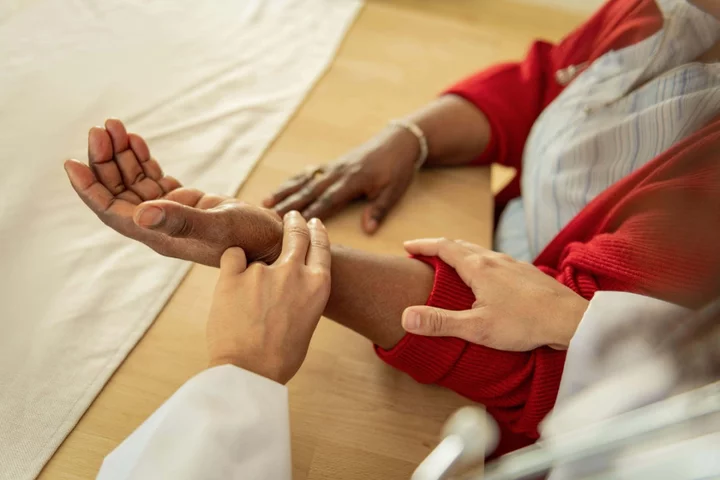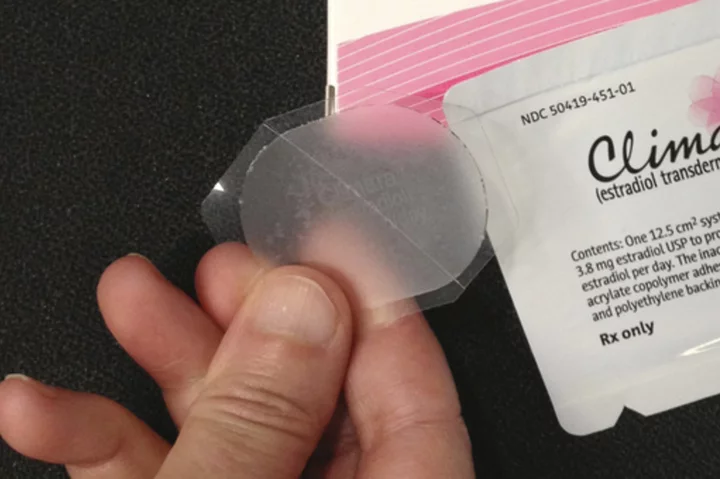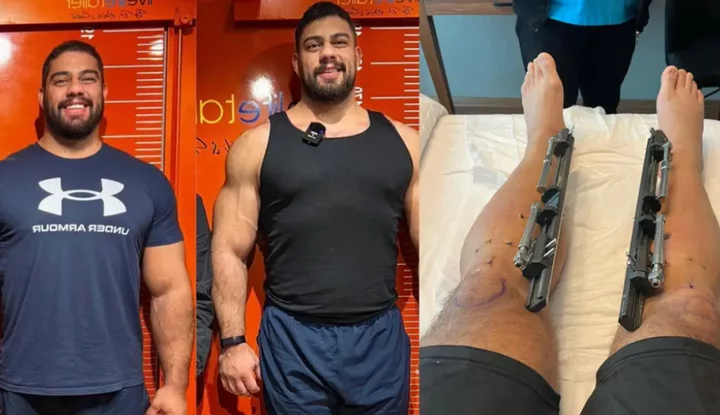
Bruker Launches timsTOF Ultra Mass Spectrometer with Transformative Sensitivity, 300 Hz PASEF MS/MS, and VistaScan™ for Enhanced dia-PASEF® 4D-Proteomics™
HOUSTON--(BUSINESS WIRE)--Jun 5, 2023--
2023-06-05 19:20

PreOmics Introduces New ENRICH-iST Kits and Novel Workflow for Unbiased, Affordable Plasma and Serum Proteomics by LC-MS
HOUSTON--(BUSINESS WIRE)--Jun 5, 2023--
2023-06-05 19:16

World Heart Rhythm Week: Could you have an abnormal heart rhythm?
It’s believed around three million Brits have an abnormal heart rhythm or arrythmia – and many may not even realise it. The most common arrhythmia is atrial fibrillation (AF), which causes an irregular and often unusually fast heartbeat, and is associated with a five-times higher risk of having a potentially fatal or life-changing stroke. If diagnosed, AF can be treated – however, it’s estimated there are at least 270,000 people in the UK who are unaware they have the condition, according to the British Heart Foundation (BHF). “What remains troubling is the sheer number of people who are undiagnosed and unaware that they are living with a heightened risk of stroke,” says BHF medical director, Professor Sir Nilesh Samani. “Finding people with this hidden threat must remain a priority.” Trudie Lobban, founder of the Arrhythmia Alliance – a coalition of patients, healthcare professionals and policymakers, adds: “Heart rhythm disorders are a leading cause of sudden cardiac death and devastating strokes, and yet too few people are aware of the rhythm of their heart.” To mark World Heart Rhythm Week (5-11 June), experts are highlighting the importance of being aware of arrhythmia warning signs and getting things checked out. Here’s what you need to know… Arrhythmias can affect all age groupsHowever, AF is most common in older age groups. As Dr Anthony Chow, a consultant cardiologist at The Wellington Hospital, part of HCA Healthcare UK, explains: “Heart rhythm problems are a very common condition that can affect all age groups, but AF is more common in older people. It can be as common as 10% of the population in their 70s, and almost 29% of those in their 80s.” Arrhythmias can have many causes Lobban says many conditions can cause heart rhythm problems, including heart failure, blackouts, electrolyte disturbances, thyroid disorders, infections, heart attacks, strokes, cardiomyopathy, high blood pressure, sleep apnoea and obesity. Triggers can also include stress, caffeine, tobacco, alcohol, diet pills, and cough or cold medicines. “But there is usually an underlying physical reason for it,” Lobban adds. Warning signs to look out for Key warning signs, says Chow, are palpations (a thumping or fluttering sensation in your heart/chest), dizzy spells and feeling faint, breathlessness, chest discomfort, and feeling overly tired. These things don’t automatically mean you have a heart problem, but it’s important to get any symptoms checked out. And Chow adds: “Not everyone experiences these exact symptoms and, in some cases, patients can experience no symptoms at all.” How to measure your heart rhythmThere are many ways heart rhythms can be measured clinically, through ECGs or monitors. You can check your pulse yourself at home, too. “The easiest way to detect an arrhythmia is to feel your pulse and hence your heart rhythm – is it irregular, too fast, or too slow?” says Lobban. “Such a simple thing as a 30-second pulse rhythm check can literally save your life.” The Heart Rhythm Alliance has a ‘know your pulse’ guide on their website. Lobban says you should sit down for five minutes beforehand, and remember that any stimulants you’ve taken, like caffeine or nicotine, will affect the rate. You’ll need a watch that measures seconds (take it off to do the test), or your phone timer could work. Hold your left or right hand out with your palm facing up and elbow slightly bent. With your other hand, place your index and middle fingers on your wrist near the base of your thumb, between the bone and stringy thumb tendon, to find your pulse. Once you’ve found your pulse, maintain a firm pressure and count the beats for 30 seconds, then multiply by two to get your heart rate in beats per minute. If your heart rhythm is irregular, you should count for one minute and don’t multiply. Arrhythmia can cause many serious health problemsHeart arrhythmia can cause a variety of serious heart health complications including strokes, heart failure and heart attacks, explains Chow. “Heart arrhythmias, in particular AF, are often associated with an increased risk of blood clots, so it’s extremely important to be aware of the warning signs,” he says. “If a blood clot breaks loose, it can travel directly from the heart to the brain, which can cause a stroke. You should consult your doctor and get referred to a cardiac rhythm specialist for assessment if you have significant symptoms.” When to see a doctor If you have any previous history of heart problems and/or are becoming increasingly concerned about palpations, you should speak to a medical expert, Chow advises. Those with a family history of arrythmia and/or sudden cardiac death should also make sure they get checked out. “It’s not usual that we’re aware of our heart beating, unless there’s a disturbed rhythm,” he says. “You should speak to your doctor if your heart palpations are lasting a long time, or aren’t improving and seem to be getting worse. Acute instances of symptoms could be a warning sign of something more serious, so it’s important to seek medical advice if you’re concerned. In some cases, arrhythmia could be an indication of a medical emergency such as a heart attack.” Treatment for arrhythmiaArrhythmias can be treated in a variety of ways. “Some require no more than reassurance after diagnosis, but others may need drug therapy, or implantation of an electrical device such as a pacemaker or ICD,” says Lobban. Chow says therapies such as cardioversion can be used to reset the heart rhythm by sending a shock through the chest to the heart, and there are also procedures and surgeries including catheter ablation, where wires are threaded through blood vessels directly to the heart and heat is used to create tiny scars in the heart to block abnormal electrical signs and restore a normal heartbeat. Chow adds: “Most people with abnormal heart rhythms can lead a normal life when the condition has been properly diagnosed and managed.”
2023-06-05 18:57

New Found Intercepts 105 G/T AU Over 27.1M at Iceberg
VANCOUVER, British Columbia--(BUSINESS WIRE)--Jun 5, 2023--
2023-06-05 18:54

Changing dishwashing habits can help save more than 3.5 million tonnes of CO2 in Europe
GENEVA--(BUSINESS WIRE)--Jun 5, 2023--
2023-06-05 18:48

Syngenta Seedcare Introduces EQUENTO®, Offering a Novel Mode of Action to Control Soil Pests
BASEL, Switzerland--(BUSINESS WIRE)--Jun 5, 2023--
2023-06-05 18:29

Trellis Energy Software Bolsters Executive Team
SAN FRANCISCO & HOUSTON--(BUSINESS WIRE)--Jun 5, 2023--
2023-06-05 18:25

'I can't complain': Marc Almond's Tainted Love royalties continue to pour in
Marc Almond says TikTok has brought the timeless classic to a whole new audience.
2023-06-05 18:24

Lauryn Hill stages Fugees reunion at Philadelphia's The Roots Picnic
The Fugees performed six songs at the festival at the weekend.
2023-06-05 18:18

Hormone patches or creams for menopause symptoms may have lower blood pressure risk than pills
Women often use hormone therapy to relieve hot flashes and other menopause symptoms — and new research suggests whether they choose pills, patches or creams might matter for their blood pressure
2023-06-05 17:27

Man spends £86,000 lengthening his limbs
A father-of-two has had limb-lengthening surgery to increase his height from 6ft to almost 6ft 7in after deciding his legs were “too short” for his body, and hopes to feel “on top of the world” once the £86,000 (USD $106,000) procedure has fully healed. Brian Sanchez, 33, a mortgage broker who lives in Georgia in the United States with his wife, Nidia, 30, and their daughters, Kaisley, two, and Kairi, six, felt in January 2022 that his body was “out of proportion” and he looked like “like a huge thumb”. After some research, he discovered he could have limb-lengthening surgery in Turkey to become his ideal height and as soon as he saw it he thought: “OK, I guess this is what I’m doing.” Brian’s main reasons for wanting the surgery were not only for his physical appearance but also to improve his weightlifting goals in the gym and be around nine inches taller than his wife so they will no longer be at “almost eye level”. When he told his loved ones about his plans, they thought it was “typical of (him)” as just because “something is crazy it never means that (he) won’t do it”. Brian had his first operation in December 2022, which involved breaking his tibia and fibula, putting a rod inside the bones, and fastening it with screws. He underwent a second procedure in March 2023 to extend his femur. To recover, Brian had to be in a wheelchair and turn the screws with an Allen wrench four times a day, but when he is fully recovered he thinks the pain will have been “worth it” as he will be able to “enjoy being taller”. “My wife is pretty tall – we were only about three inches apart – but once I’m fully recovered it’ll be a nine-and-a-half-inch difference,” he said. “It’s going to be really nice just to be able to hug her and have her all the way down there on my chest instead of being almost eye level. “One of the things that I’ll enjoy the most is being able to work out again and put some weight on my legs and have my body look a little bit more how I want it to.” In January 2022, Brian suddenly realised his legs didn’t match his “torso proportions”. He said: “I realised that my legs were always looking weird, and I didn’t know what it was, until one day I was sitting next to my brother-in-law who is almost 6ft 6in, and I was actually a little taller than he was. “I thought that was weird, because I knew he was taller than I am by a lot, and we stood up, and all of a sudden, I started looking and realised my legs were too short for my body. “I’m broad, have long arms, and I’m wide, but my short legs make me look different – I almost look like a huge thumb, like those thumb men from Spy Kids.” After the realisation, Brian, who had never previously had cosmetic surgery, started to “not like (his) aesthetics” and decided to research ways to make himself taller. He said: “I thought I can either find a new hobby, and give up lifting weights, or I can fix the issue. “I started Googling and ran into the procedure from there – as soon as I saw it, I thought ‘OK, I guess this is what I’m doing’.” Brian set himself a goal of becoming at least 6ft 6in tall and said of his loved ones’ reaction when he told them about his idea: “It was a combination of disbelief, but they also said that it is typical of me. “I know this is a very crazy thing, it’s extremely expensive, time-consuming, difficult, painful and even risky in some respects.” In December 2022, he had his first operation in a clinic called Live Life Taller in Turkey, which cost him £30,000. The first procedure involved lengthening the tibia and fibula together. “In the first surgery, they broke my tibia and fibula and hollowed out the inside of the tibia, taking out the bone marrow,” he said. “They then put a rod inside the bone and fastened it with screws and attached the bone segments via pins to external fixators – so you have this piece of steel on the outside of your legs and have these constant open wounds that won’t close until you remove all the hardware.”. His recovery involved being in a wheelchair and using an Allen wrench to turn a bolt on the fixators four times a day at 90 degrees to separate the bone segments a little at a time. Brian continued to do this every day for two months, saying of his painful recovery: “The hardest part of the whole thing was the lack of sleep, but I think the pain will be worth it – once it’s all finished I’ll just be able to enjoy being taller, and hopefully feel on top of the world.” In February 2023, the external fixators on his tibia were removed and he was around three inches taller. In March 2023, he had the second operation, which cost him an additional £56,000, to carry out the same procedure on his femur. He said: “I actually felt great after my femur procedure, and there was almost no pain throughout the entire process, only from lengthening from actually stretching my legs.” Now, Brian is just over an additional three-and-a-half inches taller – making him just under 6ft 7in – but is still in a wheelchair and is waiting for it to be completely healed. He joked: “When it’s fully healed, I’m trying to not have expectations because I don’t want to be disappointed but it’s hard to imagine that I’m not going to enjoy it. “From the few times that I’ve already stood up, it is bizarre to see people that used to be my height come up to under my nose – it’s really weird, and it’s a lot of fun just seeing the world in a slightly different perspective. “I can see above the fridge more easily – not that it’s that important, but it’s cool. I’ll be able to see other people’s bald spots, everything will be just different.” Looking back on his decision to undergo the surgery, Brian said: “I didn’t need to do this procedure, but I really wanted to, and I didn’t know how hard it would be. “So, when I made the decision to do it, I kind of over-estimated how easy it would be and under-estimated how much pain and how much difficulty would be involved. “I don’t regret my decision, and I hope that I’m going to be really happy with the results.” Read More The worst day of the week for heart attacks revealed Husband of non-smoker, 24, who died two weeks after lung cancer diagnosis reveals single telltale sign A Place In The Sun’s Jonnie Irwin admitted to hospital amid terminal diagnosis Triathlete shares race photo where she bled through swimsuit while on her period The telltale sign of lung cancer everyone should know A Place In The Sun’s Jonnie Irwin admitted to hospital amid terminal diagnosis
2023-06-05 17:27

Germany Lines Up €50 Billion to Help Heavy Industry Go Green
Germany plans to help energy-intensive manufacturers transition to climate-neutral technologies with roughly €50 billion ($53.4 billion) in subsidies.
2023-06-05 17:24
